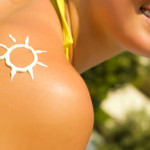The Pros and Cons of Sunshine

Ah…summer. Time to enjoy the great outdoors! Hopefully you’ve had the opportunity to capture the warmth of the sun on your skin numerous times over these past few months.
Hey, did you just pause to question my encouragement about allowing those “dangerous” sunrays to shine directly upon on your unprotected skin? No wonder; scientific researchers have stated that sunshine is good for us and that sunshine is bad for us. So, which is it? Should we seek after the sun, or run and hide from it?
As with most things in life, moderation has once again been proven to be the way to go when it comes to sun exposure. The “pro” of sun exposure is that it’s the natural way our body creates vitamin D3—which is touted for its bone strengthening, immune system fortifying, and mood-enhancing properties. In order to generate your daily vitamin D requirement, you’ll need to spend 20 minutes in the sun with both arms and legs exposed. (Some recent studies are even purporting the benefit of 60 minutes of midday sun exposure–woohoo!) Nowadays, experts are blaming the vitamin D deficiency epidemic on the heavy use of sun block—which scientists told us not to be exposed to the sun without!
Spending more than 30-60 minutes in the sun without sun block, it’s agreed, can lend itself to the “con” of sun exposure—sunburns—which can potentially lead to skin cancer. The burning of one’s skin, even if skin cancer doesn’t develop, works against the overall health of the body because of the free radical particles a sunburn produces. These free radicals speed up the aging process in many ways, skin integrity included. So, what’s a person to do?
Here’s my advice to you, based upon the synthesis of all I’ve read*:
If you’re of fair to medium complexion, limit your unadulterated sun exposure to 20-30 minutes per day, midday exposure is best. For darker, rarely-burn complexions, apply sun block after 60 minutes of being in the sun. That said, if you’ve been told by your doctor that you have precancerous skin lesions, or if you have a family history of melanoma, use sun block from the get-go and gather up your vitamin D from a less sunny, food or supplement source.
Enjoy “D” great outdoors but remember to sun bathe responsibly!
*Please note I am a health researcher, not a dermatologist.